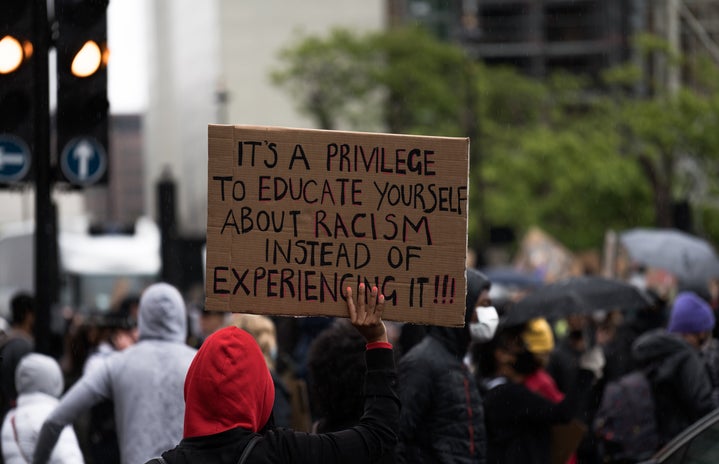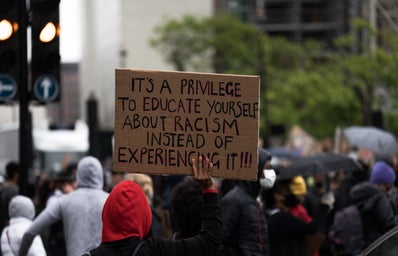Having an education major in the social sciences and a minor in women and gender studies, my course load focuses heavily on oppression; racism, sexism, classism, ableism, and any other -ism you can think of are constants in the readings and discussions in my classes. However, these discussions and readings are often unavailable to people outside of academia. My favorite reading outlining the basics of oppression alongside tools for teaching with a critical pedagogy is Is Everyone Really Equal?: An Introduction to Key Concepts in Social Justice Education by educators and social justice advocates Özlem Sensoy and Robin DiAngelo because of the fact that they make learning about oppression accessible and relatable while highlighting many misconceptions that privileged (i.e. white, heterosexual, cisgender, male, middle/upper class, able-bodied, etc.) people have in talking about issues of oppression. Here are some of the ones I grew up hearing and believing that I have loved learning to challenge- and that I implore you to challenge in your own lives.
*WARNING: If you are privileged in any social identity, you may find yourself feeling defensive when your privilege is challenged in this article and beyond. Use this as a way to learn and grow, and not as something to throw to the side because it makes you uncomfortable.
*NOTE – I am writing this article from a place of white, cisgender, middle-class, able-bodied, and heterosexual privilege among many other privileged identities.
-
“If we haven’t personally discriminated, we are not benefitting [from oppression]” (97)
-
OPPRESSION IS NOT INDIVIDUAL – While many people believe that because they don’t say or do things that are racist/sexist/classist, etc. that they are not racist/sexist/classist, etc. and therefore do not benefit from that oppression. However, oppression is institutional and not individual so “the dominant group is actually elevated by virtue of the oppression of the minoritized group… because the minoritized group has less, we necessarily have more.” Therefore, whether you commit individual acts of oppression or not, your membership in privileged groups automatically gives you advantages over minoritized groups.
-
-
“People of Color are just as racist as we are. In fact, now there is reverse racism and white people can’t get into college or get good jobs” (149-50).
-
WHITE SENSE OF ENTITLEMENT – While there is a prevalent myth that legislation like Affirmative Action takes spots away from deserving white students/employees and gives them to undeserving people of Color, this is simply untrue. First of all, this falls under the assumption that white people are inherently more deserving than people of Color which comes from the “sense of entitlement whites have to all desirable positions.”
-
AFFIRMATIVE ACTION DOES NOT REQUIRE THE EMPLOYMENT/ACCEPTANCE OF UNDER QUALIFIED CANDIDATES – Second, under Affirmative Action “no employer is required to hire an unqualified person of Color, but they are required to be able to articulate why they didn’t hire a qualified person of Color.”
-
LEGACY ADMISSIONS – Third, at many universities, there are legacy admissions which admit higher numbers of majority-white students whose parents went to a university than legislation like Affirmative Action admits students of Color.
-
REVERSE RACISM DOES NOT EXIST – Lastly, this all comes back to the idea that there is such a thing as “reverse racism.” However, “only whites have the power to infuse and enforce their prejudices throughout the culture and transform it into racism… The term reverse racism implies that power relations move back and forth, one day benefitting one group and the next day the other. But as we can see from the founding of Canada and the United States to the present time, white power and privilege remain deeply rooted and intact.” Therefore, since people of Color do not have the institutional power to convert their prejudices and discrimination into oppression, reverse racism cannot exist.
-
-
“Racism is a thing of the past. Besides, I didn’t own slaves; I wasn’t around when Indians were put in residential schools” (151-2).
-
Native American residential schools – Boarding schools that Native Americans were forced to attend in the 18-1900s by white settlers in order for Native Americans to assimilate into whiteness and abandon their native languages and cultures.
-
RACISM DOESN’T GO AWAY, IT JUST SHIFTS FORM – Just because the most violent and damaging forms of racism are no longer with us, that doesn’t mean we are not living in a deeply racist society; the racism has just changed form into racist policies in housing, economics, and schooling among other things.
-
ECONOMIC RACISM – People of Color are excluded from wealth building through “illegal but common practices such as higher mortgage rates, more difficulty getting loans, real estate agents steering them away from ‘good’ neighborhoods, discrimination in hiring, and unequal school funding.”
-
EDUCATIONAL RACISM – People of Color are also discriminated against in schools. Schools are funded by property tax, yet “youth of Color disproportionately live in poor communities… which ensures that poor communities will have inferior schools.” Additionally, students of Color are discriminated against in schools by white teachers determining what proper behavior and academic standards are and how they will be measured.
-

-
“People just need to work hard and not expect handouts.” (171)
-
WHO WASN’T TAUGHT HARD WORK, THEN? – When middle- and upper-class people claim that they are successful because they were taught to work hard, it inherently implies that other groups of people weren’t taught that same value. Who are those other people? Why do we believe they were not taught the value of hardwork?
-
PRISON INDUSTRIAL COMPLEX – A form of hard work that is hardly ever acknowledged is prison labor. The mass incarceration of Black people in America has allowed the “labor of Black prisoners [to replace] the labor of Black slaves.” Major corporations like Walmart, McDonald’s, Whole Foods, BP Oil, Wendy’s, Victoria’s Secret, Starbucks, Fidelity Investments, Sprint, Verizon, JCPenney, and many more use prison labor to cut costs by paying inmates next to nothing for their work. For example, “federal prisoners are paid $0.12 to $1.15 per hour while state wages range between $0.13 and $0.32 cents per hour.” Even though these laborers are working incredibly hard and under grueling conditions, they simply cannot benefit economically.
-
- “Immigrants are stealing our jobs.” (178)
- IMMIGRANTS ARE DOING THE WORK NOBODY ELSE WANTS TO DO – While privileged folks use the rhetoric of ‘stolen jobs’ as a way to be xenophobic toward immigrant communities, specifically communities of Color, it simply is not true. Sensoy and DiAngelo write, “immigrants tend to cluster in the very vocations and jobs that locally born people don’t want to do. These immigrants are hired by companies who choose to hire them, and who benefit from their cheap (or exploited) labor. The work they do is typically the most grueling, demeaning, and dangerous work that others have refused to do… If immigrant workers are undocumented, they cannot complain about working conditions or unjust practices. This benefits the corporation, not the workers.” Therefore, immigrants are often forced into doing the most undesirable work, often for the lowest wages, in jobs that white Americans would never choose to do in the first place.
- “We live in a classless society where anyone can make it” (167)
-
MYTH OF THE AMERICAN DREAM – Over 70% of people agree that personal motivation is more important to class mobility. However, the minoritized people that ‘make it’ are the exception rather than the rule. Most people cannot achieve the American dream due to their social class, not for lack of hard work.
-
CULTURAL CAPITAL – This refers to the idea that we “relate to the class we are born into, and this ensures that we will be most comfortable in and surround ourselves with people who share our class culture.” This culture exists in the schools, neighborhoods and workplaces we choose to enter and keeps us in those kinds of spaces. Additionally, upper class individuals have more cultural and social capital which means they have more access to upper class spaces and experiences as well as more networks and connections to keep them in the upper-class. People without this cultural capital will have a hard time making it into upper-class spaces despite hard work and perseverance.
-
As I discussed earlier, this article could cause discomfort for those with privileged identities, especially those with multiple privileged identities. Instead of being defensive, accept what is and use it to change your future behavior and to challenge these misconceptions in your everyday lives.
“Not one of us will ever be free until we are all free.” – Audre Lorde


